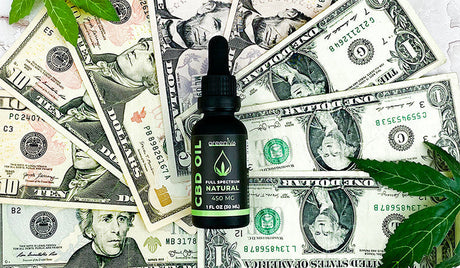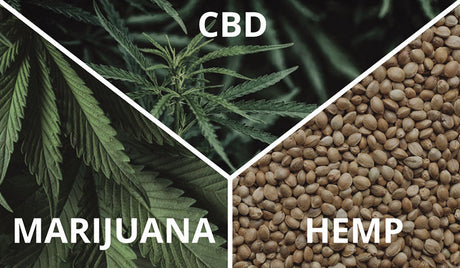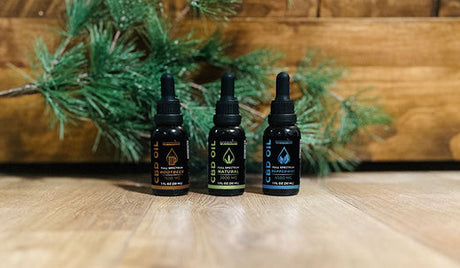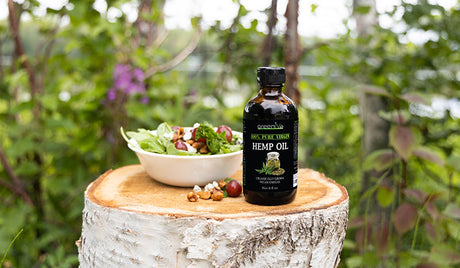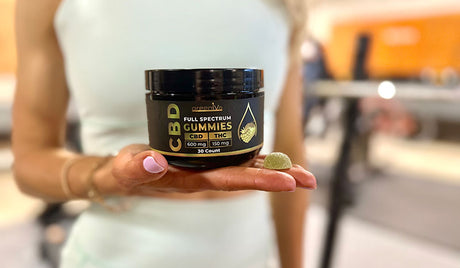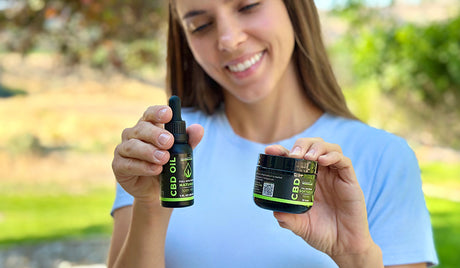We're exploring a topic that's creating a buzz in the world of natural products: What is better, THC or CBD? You may have encountered these terms previously; however, what is the actual distinction?
We will refrain from using complex scientific jargon. Our aim is to break it down for you in the simplest way possible. So, if you've ever wondered about the distinctions between these two potent compounds found in the cannabis plant, you've come to the right place.
What Is CBD?
Cannabidiol, or CBD, is derived from the Cannabis sativa plant or Industrial Hemp. Most people use CBD to help improve mood, discomfort, and sleep symptoms. Those taking CBD do not have feelings of "euphoria" or "get high" because CBD does not have psychoactive properties.
CBD is often taken in the form of capsules, topical creams, gummies, oils, and edible products. Some CBD oil is paired with hemp seed oil, which is rich in omega fatty acids, but a true CBD product does not come solely from hemp seed oil.
What Is THC?
Tetrahydrocannabinol, or THC, is a psychoactive compound from the cannabis indica plants or Marijuana. It can cause those who use it to have feelings of "euphoria" or cause a "high." THC is most commonly found in the Marijuana plant and is typically smoked, but it can be found in edibles, capsules, oils, etc., like CBD products. THC is most often used for either recreational use or for medical cannabis purposes.
What's The Differences Between CBD vs. THC
While they have similar chemical structures, they interact differently with the endocannabinoid system and receptors in the brain. THC attaches itself to the CB1 receptors. When the THC stimulates the CB1 receptors, the user gets that "high" feeling, amongst other benefits and side effects.
CBD plays a role with CB1 vs CB2 receptors indirectly and may produce the same benefits that THC offers without the "high." Let's discuss what the benefits are below.
CBD vs. THC Benefits
CBD and THC have been used to potentially help improve many different symptoms. Here is a list of possible therapeutic properties of THC and CBD and their differences.
Benefits of CBD
CBD and cannabis product use can be traced back as far as 2900 B.C. This cannabinoid has been used to assist the human body in many ways through the years.
The reason CBD is able to be used is because the cannabinoid works in sync with our body's endocannabinoid system (ECS). Our ECS is comprised of neurotransmitters that bind to receptors throughout our central nervous system, immune system, and organs.

Because of the ECS, when our body takes in CBD or other cannabinoids like it, it is able to process and send this cannabinoid to these receptors, which may assist with the following:
- mood
- sleep
- discomfort
There could be other benefits of using CBD, but more research is needed to know the exclusive benefits that CBD may offer.
Benefits of THC
Anyone who has used Marijuana or has heard from someone who has used the plant before may already have a general idea of what THC has to offer.
Typically, THC is most well-known for giving the user a feeling of euphoria and complete relaxation when taken in high doses. THC has some of the same benefits as CBD and may assist with the following:
- mood
- sleep
- discomfort
The main difference between CBD and THC benefits is that THC can provide a high feeling of euphoria, whereas CBD does not. CBD vs. THC have many similarities concerning the benefits, but the side effects are where they stand apart.
Side Effects of CBD vs. THC
Before taking something, it's always important to know if you are at risk by taking it. Common knowledge that THC is potentially risky when taken, but is CBD? Let's dive into the possible side effects of both.
CBD Side Effects
The CDC and the National Library of Medicine have listed these as potential side effects of CBD:
- Liver damage
- Interference with medication
- Diarrhea or changes in appetite
- Changes in mood
- appetite changes
- fatigue
- weight loss
- dizziness
- sleepiness and drowsiness
A number of clinical trials have been recorded on the side effects of CBD, but there still could be more, and this may not be a complete list. However, these studies suggest that CBD side effects typically do not occur unless you've taken more than 1,500 mg of CBD at once or in one day.
Taking too much CBD is not an issue because most users who take CBD only need anywhere from 10mg to 100mg of CBD per day. However, more research is still needed before we know the full list of possible side effects of CBD. Always wise to consult your physician before taking it.

THC Side Effects
According to the National Library of Medicine, THC has these potential side effects:
- Dysphoria (discomfort or unease)
- Paranoia
- Sedation
- Confusion
- Headache
- Dry Mouth
- Euphoria
- Nausea and Vomiting
- Low Blood Pressure
This is not a complete list, and there could be more potential side effects based on each individual using THC. The amount of THC that a user would have to take to see these types of side effects is as little as 15 to 20mg+ of THC.
Taking THC in higher amounts puts the user at risk for the possible side effects listed above. Although, when THC and CBD are taken together, CBD has been known to counteract some of the effects that THC may cause. These effects may be long or short-term, depending on the amount of THC ingested.
Both are different and have side effects when discussing CBD vs. THC. Important to research these before starting use.
The legality of CBD and THC
The 2018 Agriculture Improvement Act, as recognized by the Centers for Disease Control and Prevention (CDC), federally removed hemp from the controlled substances list. This legislation legalized CBD derived from hemp.
However, individual state regulations vary, and some states maintain hemp on their controlled substance lists, thereby prohibiting CBD within their jurisdictions. Therefore, it is crucial to consult applicable state and local laws regarding CBD prior to purchase and use.
The legal status of THC is more complex. While numerous states have legalized marijuana, including THC, some have restricted legalization to medical use only, while others permit both medical and recreational use. Currently, 13 states maintain a prohibition on marijuana.

The U.S. Food and Drug Administration (FDA) clarifies that the 2018 Agriculture Improvement Act (commonly called the Farm Bill) stipulates that CBD derived from hemp must contain no more than 0.3% THC.
However, three states maintain a zero-tolerance policy for THC, meaning that CBD products must be entirely free of THC to be legal within those jurisdictions. Therefore, essential to verify applicable local and state laws regarding THC before purchasing or using any CBD product.
How To Take CBD and THC
CBD and THC can be administered in many ways. They are frequently found in gummies, edibles, capsules or softgels, oils, and smokables.
When taking CBD or THC, you will want different milligrams of both. Depending on your body's weight, age, tolerance, and gender may also determine how much CBD or THC you should take.
Typical CBD dosage amounts range between 10mg to 100mg per serving. A recommended starting dosage range for THC is 5mg to 15mg. For more detailed dosing information, please refer to our Blog post titled "How much CBD should I take?"
Drug Testing
Both CBD and THC are stored in the body's fat tissues and can persist in the system for 11 to 28 days, potentially resulting in positive drug test results during this period. Over-the-counter drug tests typically screen for cannabinoids in general, while more sophisticated laboratory tests (often utilized by employers) specifically target THC.
Consequently, it is possible to test positive for THC even if the concentration is below the federally mandated limit of 0.3%. Individuals subject to drug testing should consult with the administering party to ascertain the permissibility of CBD or CBD products containing THC.
Summary
CBD vs. THC there are many similarities but also many differences. Both have great potential to improve wellness when taken daily, but both may also cause issues when taken in excess.
Important to note that both CBD and THC have their own separate benefits, but when paired together, they make a powerful combination. CBD helps to counteract the negative effects of THC, and both work together to assist in general wellness.
If you are looking for a combination of CBD and THC, the product for you is Full Spectrum CBD oil. You can find Full Spectrum CBD oil with a range of CBD and THC potencies. We recommend trying our GreenIVe Full Spectrum CBD Oil, which contains less than 0.3% THC, paired with high-quality CBD. We promise you'll love it within 30 days or get your money back.
GreenIVe Full Spectrum CBD Products



